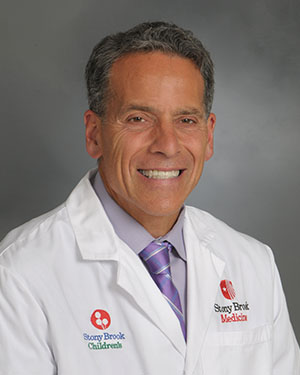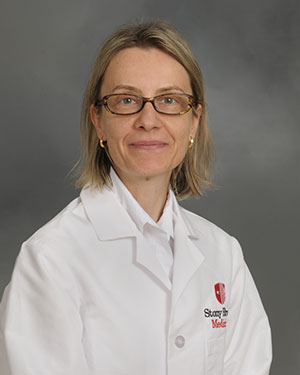Navigation Duchenne Muscular Dystrophy Comprehensive Care Center
Duchenne Muscular Dystrophy Comprehensive Care Center
The opening of the Duchenne Muscular Dystrophy Comprehensive Care Center at Stony Brook Children’s Hospital marks a new era in the level of care available to the 1,000 patients, primarily boys, in the tri-state area of New York, New Jersey and Connecticut, affected by Duchenne muscular dystrophy (DMD), the disease’s most common form.
Unparalleled in the region, the center is modeled on standards of excellence established by the Centers for Disease Control and other major national organizations. Our advanced, multidisciplinary and coordinated approach to care sets us apart from other muscular dystrophy programs and providers.
Services
Our goal is to enable patients to live both as fully and as long as possible, while paving the path toward increasingly improved outcomes. Our approach to care includes the following:
All muscular dystrophies are genetic diseases. Confirming the patient’s diagnosis through genetic testing is vital to accurate identification of the disorder’s genetic pathway, prognosis and potential treatments. Patient evaluation also may include an assessment of the child’s cardiac and pulmonary function, DEXA bone scanning and other neurological tests.
Duchenne muscular dystrophy (DMD) is a muscle-degenerating disease that not only affects mobility, but also can cause heart, respiratory and other complications, leading to decreased life expectancy. A comprehensive, multidisciplinary approach to care is vital to delaying and minimizing symptoms and helping the child remain as comfortable, engaged and active as possible.
At Stony Brook Children’s, the DMD team includes experts in neuromuscular disorders, cardiology, genetics, pulmonary medicine and other specializations in addition to a full range of therapies, nutrition and support services. The team works closely with the family, as well as with primary care physicians, to address the child’s total needs.
A key member of the Duchenne muscular dystrophy (DMD) team is a dedicated nurse who serves as the coordinator and main liaison between the family and the rest of the team. The nurse coordinator pre-screens incoming patients, obtains their medical records, and ensures that the family’s needs are being accurately anticipated, and that patients and providers are effectively communicating. The coordinator also schedules care center visits – designated days when families can see multiple specialists in a consolidated block of appointments at the center. This not only reduces stress on families, but also fosters a faster and better flow of information among providers. If advanced imaging services such as cardiac MRI are required, the initial evaluation may be a two-day process, and patients and families from out of town are assisted in finding overnight accommodations.
The Duchenne muscular dystrophy (DMD) social worker helps identify resources that foster wellness and independence, and serves as a vital communications link with schools regarding accommodations and support services. The social worker helps families, advocating on their behalf and accessing resources to ease the financial concerns of raising a child with significant medical needs.
Historically, boys with Duchenne muscular dystrophy (DMD) usually did not survive beyond their teen years. Today, survival into the late 20s is more common and there are some cases of men with DMD who survive beyond. At Stony Brook Children’s, we are committed to improving the care of DMD patients by rapidly bringing evidence-based medicine and best clinical practices to our DMD patients. The drug Exondys 51 is an example. Provisionally approved by the FDA in September 2016, Exondys 51 is the first treatment indicated for patients who have a specific confirmed mutation of the dystrophin gene, which affects about 13 percent of the population with DMD.
Our Team
Medical Director
Heading the DMD care team is Peter J. Morelli, MD. He brings an exceptional breadth and depth of expertise to his role as medical director. Alongside Dr. Morelli is our Neuromuscular Specialist, Simona Treidler, MD. Together, they lead a group of highly skilled specialists who offer advanced, individualized and comprehensive care for patients with muscular dystrophy and other neuromuscular diseases.
Nurse Coordinator
Our dedicated nurse serves as the coordinator and main liaison between the family and the rest of the team.
Social Worker
Our designated social worker provides access to resources, and supports and advocates for families in the hospital, the community and schools.
In addition, the team includes pediatric specialists from:
- Cardiology
- Endocrinology
- Gastroenterology
- Genetic testing and counseling
- Neurology
- Palliative care
- Physical, occupational and respiratory therapy
- Pulmonology
- Social work
- Additional support services
Location
Duchenne Muscular Dystrophy
500 Commack Road, Suite 104Stony Brook, NY 11794
For consultations/appointments, call (631) 216-8195.
Frequently Asked Questions
Muscular dystrophy (MD) is an umbrella term for more than 30 genetic diseases that cause progressive weakness and degeneration of the muscles used in movement. Duchenne muscular dystrophy (DMD), the most common form of MD, accounts for about 50 percent of muscular dystrophy cases. DMD results from an absence of the muscle protein dystrophin,which helps muscles stay strong.
Symptoms of Duchenne muscular dystrophy (DMD) usually begin to show up around the time a toddler learns to walk. A child with DMD may have a waddling gait and frequently falls, especially when running. He may have difficulty getting up from sitting position or from lying down. Postural changes may occur. Progressive muscle weakness can affect other organ systems and lead to difficulty breathing or heart failure.
Complications of DMD may include difficulty breathing, respiratory infections, swallowing problems, heart problems, bone thinning and scoliosis (curving of the spine). Some degree of cognitive and behavioral impairment may occur. Children with DMD can lose the ability to walk by early adolescence.
Although all muscular dystrophy is genetic, about one third of the families of DMD patients have no prior history of the disease. This is because DMD may occur as a result of a spontaneous genetic mutation. Genetic counselors at Stony Brook Children’s Hospital can offer detailed information about genetic testing and inheritability.
Duchenne muscular dystrophy is caused by a mutation on the X, or male sex chromosome, so it mostly affects boys. However, girls and women who carry the defective gene may show some milder symptoms.
Some forms of MD appear in infancy or childhood, while others may not appear until middle age or later. Each of the dystrophies causes progressive skeletal muscle deterioration and weakness, but severity and life expectancy varies.
We diagnose, treat and manage all forms of muscular dystrophy and neuromuscular disorders in children, with a special emphasis on Duchenne. The launch of our center is supported in part by Hope for Javier, a non-profit organization whose mission is to change the predicted outcome for all boys diagnosed with Duchenne muscular dystrophy by funding research, advocacy and ultimately transforming the way healthcare is delivered to medically underserved boys.
Research and Education
Bringing together the expertise and resources of Suffolk County’s only academic medical center, we are committed to bringing effective, leading-edge care and services to our muscular dystrophy patients. This includes rapid application of new knowledge and providing access to clinical trials.
Stony Brook Children’s, as part of an academic medical center and research leader, we can identify clinical trials to benefit muscular dystrophy patients as we continue to fight this disease on multiple fronts.


 Español
Español
